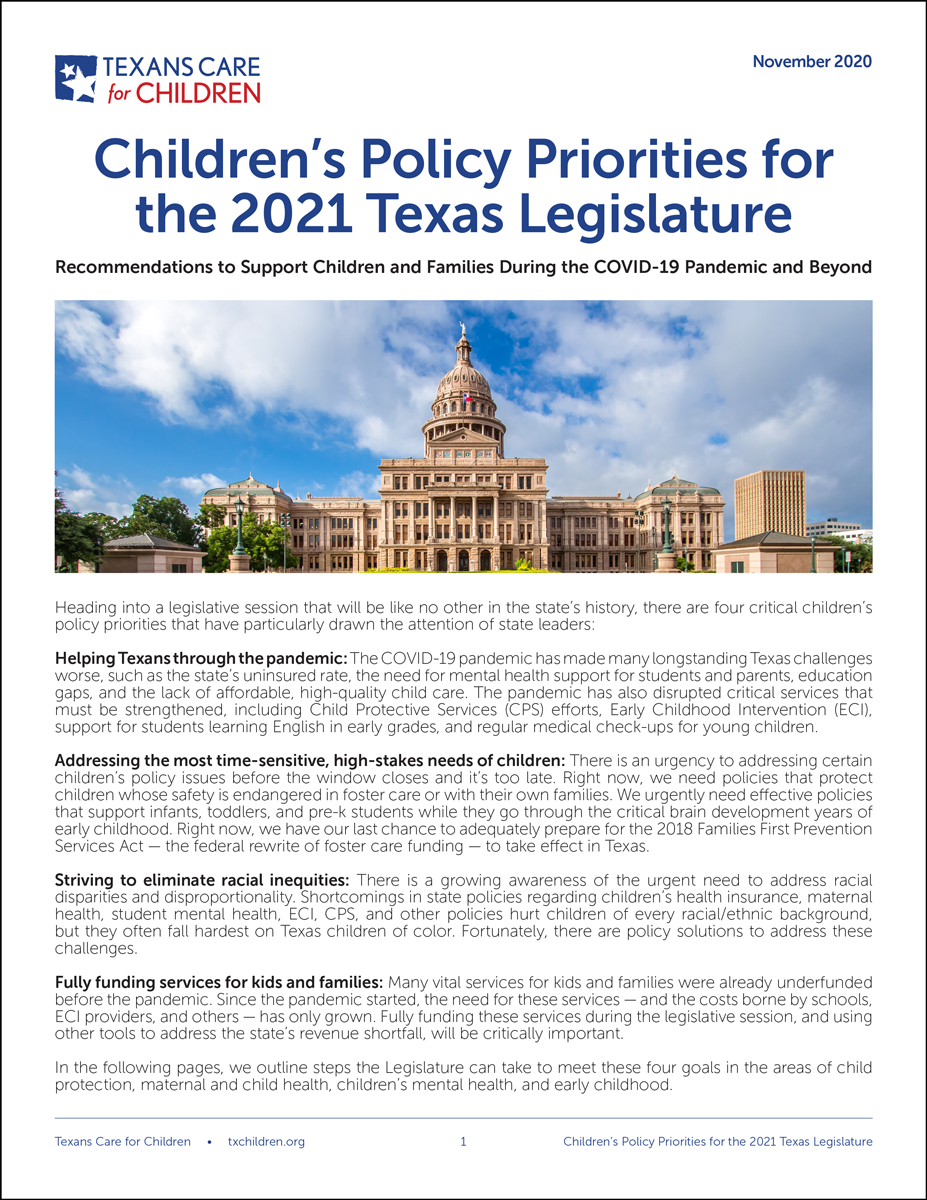Recommendations to Support Children and Families During the COVID-19 Pandemic and Beyond
Heading into a legislative session that will be like no other in the state’s history, there are four critical children’s policy priorities that have particularly drawn the attention of state leaders:

Helping Texans through the pandemic: The COVID-19 pandemic has made many longstanding Texas challenges worse, such as the state’s uninsured rate, the need for mental health support for students and parents, education gaps, and the lack of affordable, high-quality child care. The pandemic has also disrupted critical services that must be strengthened, including Child Protective Services (CPS) efforts, Early Childhood Intervention (ECI), support for students learning English in early grades, and regular medical check-ups for young children.
Addressing the most time-sensitive, high-stakes needs of children: There is an urgency to addressing certain children’s policy issues before the window closes and it’s too late. Right now, we need policies that protect children whose safety is endangered in foster care or with their own families. We urgently need effective policies that support infants, toddlers, and pre-k students while they go through the critical brain development years of early childhood. Right now, we have our last chance to adequately prepare for the 2018 Families First Prevention Services Act — the federal rewrite of foster care funding — to take effect in Texas.
Striving to eliminate racial inequities: There is a growing awareness of the urgent need to address racial disparities and disproportionality. Shortcomings in state policies regarding children’s health insurance, maternal health, student mental health, ECI, CPS, and other policies hurt children of every racial/ethnic background, but they often fall hardest on Texas children of color. Fortunately, there are policy solutions to address these challenges.
Fully funding services for kids and families: Many vital services for kids and families were already underfunded before the pandemic. Since the pandemic started, the need for these services — and the costs borne by schools, ECI providers, and others — has only grown. Fully funding these services during the legislative session, and using other tools to address the state’s revenue shortfall, will be critically important.
In the following pages, we outline steps the Legislature can take to meet these four goals in the areas of child protection, maternal and child health, children’s mental health, and early childhood.
Our Recommendations to the 2021 Legislature for Addressing These and Other Children’s Policy Priorities.
Child Protection
The Legislature should ensure more children are safe with their families; keep children out of foster care when it can be done safely; ensure children in foster care are safe and supported; and reduce racial disparities and disproportionality in the Child Protective Services (CPS) system.
- Prevent abuse/neglect and foster care entries by investing in Prevention and Early Intervention (PEI) programs and leveraging federal funding available under the 2018 Family First Prevention Services Act.
- Improve the safety and support for children in Residential Treatment Centers (RTCs), and avoid the overuse of RTCs, by taking the following steps: help facilities meet new federal Family First Act standards, expand eligibility for Treatment Foster Family Care, and increase court oversight of foster care facilities.
- Ensure mothers with substance use disorders and their newborns are supported with effective services as a family, rather than removal of the child by CPS.
- Protect and support children who face particularly high risks in the CPS system, including Black children, who are disproportionately removed from their families; pregnant and parenting youth in foster care; older youth transitioning out of foster care; and youth dually involved in foster care and the justice system.
Maternal and Child Health
The Legislature should fully fund health programs; support healthy moms, healthy pregnancies, and healthy babies; ensure children have health insurance; and support access to Early Childhood Intervention for toddlers with disabilities.
- Fully fund health programs, including Medicaid, CHIP, Healthy Texas Women, Family Planning Program, and community-based mental health and substance use treatment and recovery programs.
- Provide a health insurance option to low-wage adults by accepting federal Medicaid expansion funding.
- Support healthy babies and mothers by extending Medicaid coverage for eligible mothers from 60 days to 12 months after childbirth.
- Further support maternal and infant health by promoting team-based prenatal and pediatric care, such as CenteringPregnancy and CenteringParenting; establishing a perinatal psychiatric teleconsultation program to help moms with maternal depression; and funding the Department of State Health Services (DSHS) maternal and child health division, including funding for TexasAIM initiative.
- Ensure eligible children are enrolled in health coverage by providing 12-month continuous coverage in Children’s Medicaid — rather than using inaccurate mid-year eligibility checks — and strengthening outreach and enrollment efforts.
- Provide Early Childhood Intervention (ECI) to toddlers with disabilities and bring the state ECI program into compliance with federal law by fully funding the program, ensuring more insurance plans cover critical ECI services, and increasing referrals from child care to ECI.
Children’s Mental Health
The Legislature should support student mental health; prioritize prevention and intervention — not punishment — in addressing substance use among students; and support comprehensive suicide prevention in state services and community settings.
- Support student mental health by investing in greater capacity at the Texas Education Agency (TEA) and Education Services Centers (ESCs) and a new school mental health grant program.
- Further support comprehensive school-based mental health efforts by training school board members and superintendents; leveraging the Statewide Plan for Student Mental Health; and supporting school-based telehealth services.
- Require school district substance use prevention and intervention plans to include multi-tiered strategies aimed at keeping all students safe and supporting those in need of help; authorize the use of graduated sanctions and alternatives to automatic suspension/expulsion.
- Fully fund the Health and Human Services Commission (HHSC) Youth Prevention programming offered in schools and other settings to reduce youth substance use and other risky behaviors.
- Ensure state agencies that work with children have policies and procedures related to suicide prevention, intervention, and postvention that are aligned with national best practices.
- Include suicide prevention among the duties of Local Mental Health Authority professionals working within ESCs.
- Support local/regional efforts to prevent and address suicide among Texans of all ages.
Early Childhood
The Legislature should support access to high-quality, full-day pre-k; high-quality affordable child care; effective early childhood programs for English Learners; and Early Childhood Intervention.
- Help children attend high-quality full-day pre-k by continuing and building on early education provisions from last session’s House Bill 3; ensuring that enrollment-based funding in pre-k and Kindergarten is not jeopardized by enrollment declines due to COVID-19; limiting enrollment in pre-k classes to 22 students; and requiring teacher-student ratios to not exceed 11:1.
- Dedicate COVID-19 relief funding to support early grade educators and provide quality learning materials and devices. Funding should be prioritized to meet the needs of children most at risk for learning loss, including pre-k students and English Learners.
- Improve the educational environments for Texas English Learners by strengthening educator preparation programs, student progress monitoring, and family engagement practices.
- Create a state strategic plan to guide action that addresses the needs of English Learners across all early learning systems.
- Increase access to high-quality child care programs serving low-income infants and toddlers and strengthen the early childhood workforce that supports them.
- Ensure that parents of children in child care receive information about addressing challenging behaviors, developmental milestones, and ECI services and that programs offer safe and inclusive child care.
- Provide Early Childhood Intervention (ECI) to toddlers with disabilities and bring the state ECI program into compliance with federal law by fully funding ECI, ensuring more insurance plans cover critical ECI services, and increasing referrals from child care to ECI.



